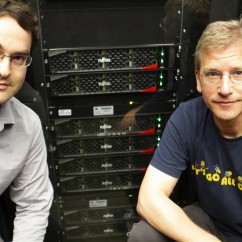
Researchers at the University of Regensburg in Germany are extending their exploration of the origins of the universe boosted by a new Fujitsu supercomputer, the PRIMEHPC FX700 underpinned by the new Arm-based Fujitsu A64FX processor. The university’s QPACE4 (QCD Parallel Computing Engine 4) project can now reach new insights, using a supercomputer based on technology developed by Fujitsu for the supercomputer Fugaku, recently ranked No. 1 in the TOP500 list of the world's supercomputers.
The Scientists of the University of Regensburg is leveraging the significant increase in compute capability for numerical simulations as part of its exploration of quantum chromodynamics (QCD). This work aims to understand fundamental particles better, including the inner structure of the proton, and ultimately to determine the state of the universe immediately after the Big Bang. The supercomputer will also be used by the University of Regensburg in the field of bioinformatics, with a focus on cancer research and immunology.
As well as superior performance per Watt, the A64FX processor also incorporates Scalable Vector Extensions (SVEs). Developed for applications in high performance computing (HPC), this speeds up complex calculations by allowing the same mathematical operation to be carried out in parallel on large amounts of data. In addition, the processor is coupled to an extremely fast main memory (High Bandwidth Memory, or HBM2), which for most applications is just as important as pure computing power, delivering a highly balanced ratio of computing power, memory bandwidth and network bandwidth, and avoiding performance bottlenecks. A further important difference is that the Fujitsu system’s computing power is not based on graphics cards. This makes it much easier to program, especially in the case of massive parallelization, which is essential for so-called ‘Grand Challenge’ applications.

